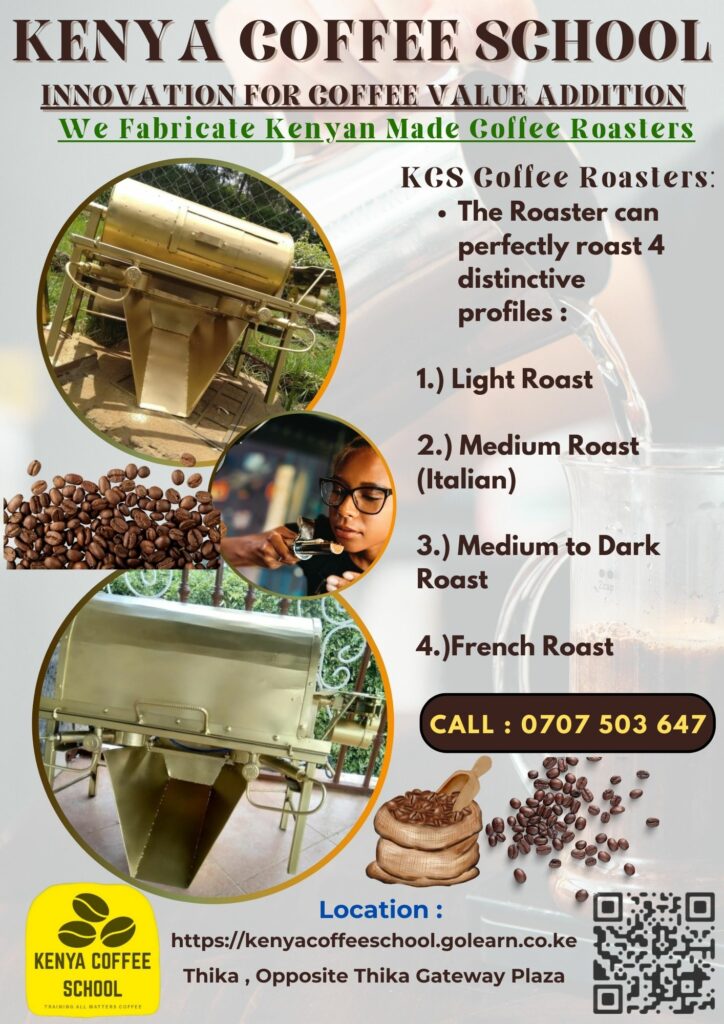
The Problem: High Costs, Low Control
For decades, Kenyan coffee farmers grow some of the world’s best beans—only to sell them raw at low prices to foreign buyers. The biggest barrier? Roasting.
Roasting transforms green coffee beans into the aromatic, flavorful product we know. But in Kenya, small-scale farmers and young entrepreneurs couldn’t afford imported roasting machines, which cost millions of shillings. Without roasting, they remain stuck at the bottom of the value chain—selling cheap, unprocessed beans while others profited.
Alfred Gitau Mwaura had seen a different reality in Italy. At the University of Gastronomic Sciences in Pollenzo and during his training at Lavazza in Torino, he witnessed how roasting unlocked higher profits and creative control. He asked himself: What if every Kenyan farmer and young coffee entrepreneur could roast their own beans?
The Birth of 4A Coffee Roasters
Returning to Kenya, Alfred set out to design a solution—a locally made, affordable coffee roaster that would democratize access to roasting technology. After months of prototyping, testing, and refining, he launched 4A Coffee Roasters—Kenya’s first innovative, small-scale, and cost-effective coffee roaster.
The name “4A” stands for:
- Affordable – Priced at a fraction of imported machines, making it accessible to smallholders and Youth.
- Adaptable – Works with different heat sources (gas, electricity (Solar powered Motors) and batch sizes.
- African-Made – Designed and built in Kenya.
- Automated (Semi-Automatic Control) – Simplifies roasting for beginners while allowing precision for experts.
How 4A Coffee Roasters Changes the Game
Before 4A Roasters:
- Farmers sold raw beans for KES 50–100 per kg to middlemen.
- Youth with coffee passion couldn’t afford roasting equipment.
- Kenya exported 80% of its coffee unroasted, missing out on higher profits.
After 4A Roasters:
- Farmers and youth can now roast their own coffee, selling it for KES 1,500–3,000 per kg as premium packaged coffee.
- Entrepreneurs launch their own coffee brands, from Nyeri to Nairobi.
- Kenya’s coffee value chain shifts—from exporter of raw beans to producer of finished products.
Impact on Farmers & Youth
- Jane Wambui, a coffee farmer in Kirinyaga, used to earn KES 80/kg for her beans. After buying a 4A Roaster, she now sells roasted, branded coffee at KES 2,500/kg—a 3,000% increase in value.
- David Ochieng, a 24-year-old barista in Nairobi, started his own micro-roastery with a 4A machine. He now supplies three cafes with his signature roast.
- Cooperatives are pooling resources to buy 4A Roasters, creating community-based roasting hubs.
The Future: A Roasting Revolution
Alfred’s vision goes beyond just selling machines. Through Kenya Coffee School, he trains farmers and youth on:
- Roasting techniques (light, medium, dark roast profiles).
- Packaging & branding (how to create market-ready products).
- Business skills (pricing, marketing, selling direct to consumers).
His goal? To see 10,000 Kenyan smallholders and youth roasting their own coffee by 2030.
“We don’t just grow coffee—we roast it, we brand it, we own it. That’s economic freedom.” — Alfred Gitau Mwaura
